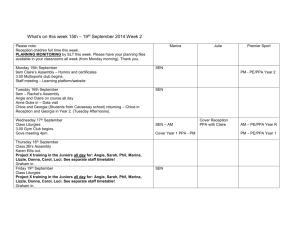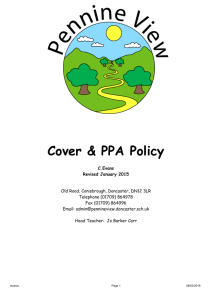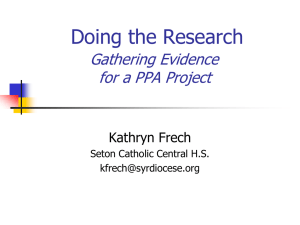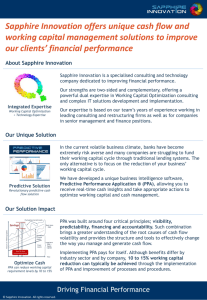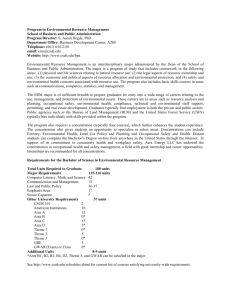PPA Advisory Board Meeting, May 12, 2006
advertisement
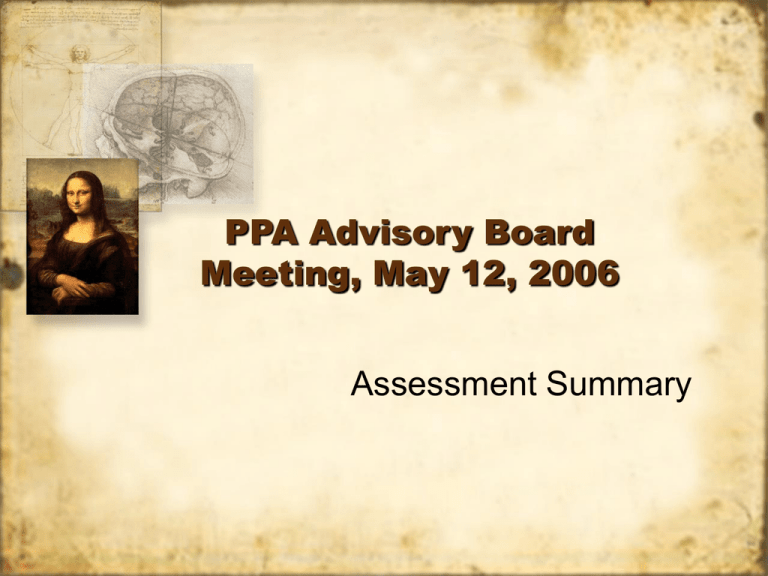
PPA Advisory Board Meeting, May 12, 2006 Assessment Summary PPA Graduate Themes and Objectives • THEME 1. COMMUNICATION. – – – – Objective 1a. Oral Communication: Students will be able to present opinions, theories, and research findings orally. Objective 1b. Writing: Students will be able to produce focused, coherent, and grammatically correct written communications applicable to government and nonprofit management. Objective 1c. Teamwork: Students will be able to collaborate effectively in team processes. Objective 1d. Interpersonal: Students will be able to demonstrate skills in personal interaction. PPA Graduate Themes and Objectives • THEME 2. THE CONTEXT OF PUBLIC ADMINISTRATION. – – – – – Objective 2a. History: Students will demonstrate knowledge of the history of public administration. Objective 2b. Politics: Students will be able to explain how the political processes of the United States influence public management. Objective 2c. Theory: Students will be able to explain the key elements of public administration theory, organizational theory and organizational behavior. Objective 2d. Diversity: Students will demonstrate awareness and sensitivity to a diverse public. Objective 2e. Careers: Students will understand the careers available in public administration and how to prepare for them. PPA Graduate Themes and Objectives • THEME 3. CRITICAL THINKING. – – – Objective 3a. Theory Application: Students will be able to apply theories to policy and administrative situations. Objective 3b. The Scientific Method: Students will be able to explain the scientific method and apply it to a policy or management issue. Objective 3c. Problem Solving: Students will be able to structure problems and apply a systematic problem solving approach. PPA Graduate Themes and Objectives • THEME 3. CRITICAL THINKING. – – – – Objective 3d. Ethical Reasoning: Students will be able to describe and apply a range of ethical perspectives to ethical dilemmas inherent in Public Administration. Objective 3e. Data analysis: Students will demonstrate ability to analyze qualitative and quantitative data. Objective 3f. Argumentation: Students will be able to organize and defend an argument. Objective 3g. Reporting: Students will integrate the elements of theory, methods, problem structuring, ethics, analysis, and argumentation to generate reports usable in government and nonprofit management. PPA Graduate Themes and Objectives • THEME 4. CORE PUBLIC MANAGEMENT COMPETENCIES. – – – – Objective 4a. Policy Process: Students will understand the stages and processes of policy making. Objective 4b. Policy Analysis: Students will demonstrate the ability to formally structure problems, forecast expected policy outcomes, recommend preferred policies, monitor observed policy outcomes, and evaluate policy performance. Objective 4c. Budgeting: Students will be able to develop budgets and know when to apply which budgeting approaches. Objective 4d. Human Resources Management: Students will demonstrate the ability to perform core and strategic human resources functions. PPA Graduate Themes and Objectives • THEME 4. CORE PUBLIC MANAGEMENT COMPETENCIES. – – – Objective 4e. Public Management: Students will be able to effectively design work, delegate tasks, manage contracts, assess performance, and implement programs. Objective 4f. Leadership: Students will be demonstrate an understanding of human behavior, leadership, and organizational theory to guide and inform leadership activities. Objective 4g. Information Technology: Students will be able to effectively use information technology to accomplish administrative and policy tasks. Assessment Procedures • TEAM-BASED LEARNING – – – The Department adopted a team-based, collective approach to assessment in 2002-2003. A team structure was chosen in order to facilitate problem solving, information sharing, and collective learning among the faculty. The Department’s team-based outcome assessment process is cyclical, involving planning meetings, program implementation, data gathering, and data analysis meetings. Assessment Procedures • OUTCOMES ASSESSMENT PROCESS – – – – Fall - Planning Meetings - Assessment Improvements. Year round - Program Implementation (teaching, support)- Program Improvements. Year round - Data gathering Winter, Spring - Data analysis meetings Feedback Assessment Activities, 2005-2006 • Since communication and analysis are critical to our MPA model, the Department chose to examine the following objectives during the 2005-2006 academic year: – – – – – – – – – Objective 1a. Oral Communication. Objective 1b. Writing. Objective 1c. Teamwork. Objective 3a. Theory Application. Objective 3c. Problem Solving. Objective 3e. Data analysis. Objective 3f. Argumentation. Objective 3g. Reporting Objective 4b. Policy Analysis. Assessment Activities, 2005-2006 • • The Department assessed these objectives during Winter 2006 in PPA 502, Program Evaluation; PPA 503, The Public Policy-Making Process; and PPA 691, Policy Analysis. The instructor for these courses developed (with Departmental input) scoring rubrics for the writing assignments in PPA 503 and PPA 691 and the midterm and final test content in PPA 502, PPA 503, and PPA 691. Assessment Activities, 2005-2006 • Conclusions: – – – – – – – – 1a (oral presentation): 90% acceptable standards. 1b (Writing): 80% to 90% acceptable standards. 1c (teamwork): 71% acceptable (NEEDS EXAMINATION BY DEPARTMENT) 3a (Theory Application): 83% acceptable. 3c (Problem solving): 82% acceptable (culminating project); 98% acceptable (PPA 503) (PROBLEM STRUCTURING AND ORGANIZATION NEED HELP IN CULMINATING). 3e (Data analysis) and 3g (Reporting): 94% acceptable. 3f (Argumentation): 86% acceptable (IMPROVEMENT OVER LAST ASSESSMENT IN 2004) 4b (Policy Analysis): 84% acceptable on exams.

